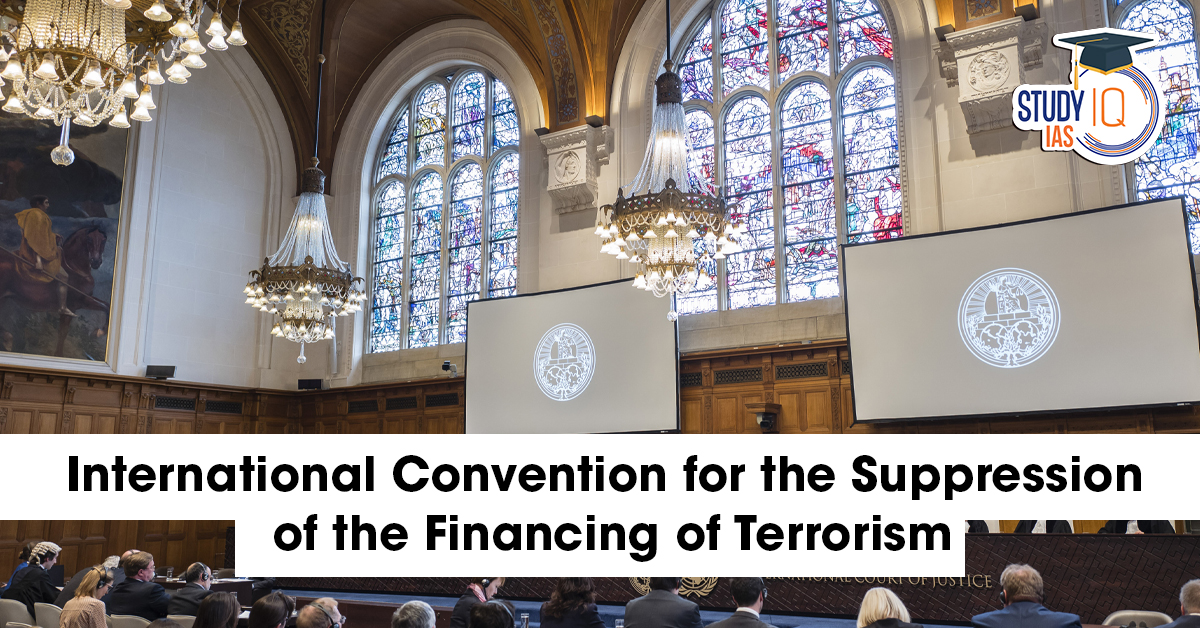Table of Contents
The International Convention for the Suppression of the Financing of Terrorism (CFT) is a United Nations treaty adopted by the UN General Assembly on December 9, 1999 (Resolution 54/109).
It came into force on April 10, 2002, and serves as one of the core international legal instruments against terrorism.
The Convention aims to criminalize the act of financing terrorism, strengthen international cooperation, and enhance information sharing among nations to prevent terrorist financing networks.
Objective
To prevent and combat the financing of terrorist acts, and to ensure that those involved in such financing are identified, prosecuted, and punished.
The Convention emphasizes that financing terrorism is as serious as committing terrorist acts themselves.
Key Provisions
1. Criminalization (Article 2)
-
It obliges each State Party to make it a criminal offense to collect or provide funds with the intention or knowledge that they will be used to carry out terrorist acts.
-
The source of funds (legal or illegal) does not matter — even legitimate money used for terrorism counts as an offense.
2. Scope
-
The Convention covers both direct and indirect financial contributions to terrorist groups or activities.
-
Applies regardless of whether a terrorist act actually occurs — intent and purpose are enough for liability.
3. Jurisdiction (Articles 6–7)
-
States must establish jurisdiction over offenses:
-
When the offense is committed in their territory;
-
By their nationals;
-
Against their nationals abroad;
-
Or when the alleged offender is present in their territory.
-
4. Extradition and Mutual Legal Assistance (Articles 10–12)
-
The Convention facilitates extradition and information sharing among signatory states.
-
Countries must assist each other in investigations, prosecutions, and proceedings related to terrorist financing.
5. Liability of Legal Entities (Article 5)
-
Legal entities (banks, organizations, etc.) can be held liable for participating in terrorist financing — through fines, sanctions, or dissolution.
6. Asset Freezing and Seizure
-
States are required to identify, freeze, and seize any assets used or intended for terrorist financing.
7. Relationship with Other Treaties
-
It complements earlier UN anti-terrorism conventions, such as those on hostage-taking, aircraft hijacking, and bombing.
Implementation and Monitoring
-
The United Nations Office on Drugs and Crime (UNODC) assists in implementing the CFT.
-
Compliance is often linked to the Financial Action Task Force (FATF) recommendations on Anti-Money Laundering (AML) and Countering the Financing of Terrorism (CFT).
Global Adoption
-
As of 2025, 190+ countries are parties to the Convention.
-
Some nations, including Iran (recently in 2025), had long delayed accession due to domestic political resistance or geopolitical reasons.
Significance
| Aspect | Importance |
|---|---|
| Legal Framework | Provides a universal standard to criminalize terrorist financing. |
| Global Cooperation | Strengthens information sharing, asset tracing, and extradition. |
| Financial Oversight | Encourages transparency in global banking systems. |
| Counterterrorism Strategy | Complements global counter-terrorism resolutions such as UNSCR 1373 (2001). |
Challenges
-
Uneven Enforcement: Some countries have weak financial regulatory systems.
-
Political Resistance: Some states oppose disclosure of financial dealings tied to strategic groups.
-
Non-State Actors: Difficult to trace funds used by decentralized or crypto-based terrorist networks.
-
Overlap with Sanctions: Compliance is hindered when national laws or sanctions regimes conflict with UN frameworks.
Relevance to India
-
India ratified the CFT Convention in 2002.
-
India consistently advocates for stronger international mechanisms to curb terror financing, particularly against Pakistan-based terrorist groups.
-
The Unlawful Activities (Prevention) Act (UAPA) and amendments to the Prevention of Money Laundering Act (PMLA) align with CFT principles.


 India–EU FTA Concluded: Key Benefits, ...
India–EU FTA Concluded: Key Benefits, ...
 Promotion of Equity in Higher Education ...
Promotion of Equity in Higher Education ...
 Bhairav Light Commando Battalion: India�...
Bhairav Light Commando Battalion: India�...

























